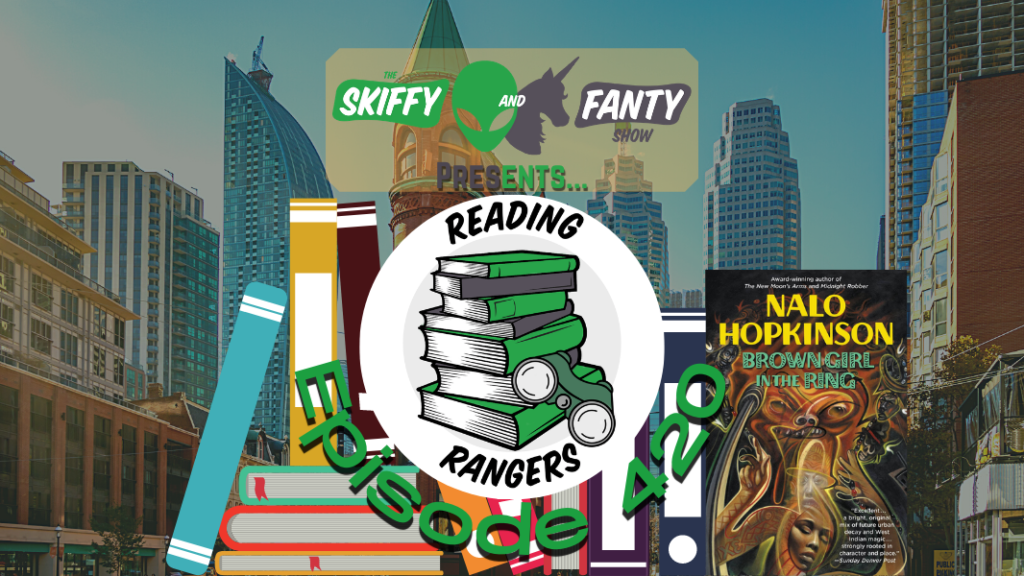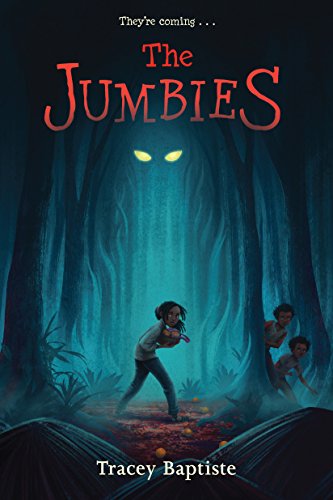420. Brown Girl in the Ring by Nalo Hopkinson (Reading Rangers)

https://media.blubrry.com/skiffyandfanty/dts.podtrac.com/redirect.mp3/archive.org/download/sand-f-420-brown-girl-in-the-ring/SandF_420_Brown_Girl_in_the_Ring.mp3Podcast: Play in new window | DownloadSubscribe: Apple Podcasts | Spotify | Android | Email | TuneIn | Deezer | RSSInvisible men, sexy moss, and gymnastics, oh my! Shaun Duke and Alex Acks join forces for the first ever A Book and Its Adaptation pairing. April 2021’s selection includes Nalo Hopkinson’s Brown Girl in the Ring and the prequel adaptation, Brown Girl Begins (2017; dir. Sharon Lewis)! In this episode, Shaun and Alex discuss Hopkinson’s novel, diving into the book’s themes, its treatment of white flight and Caribbean culture, its exploration of medical and cultural power, and its significance, among other amazing subjects. Thanks for listening. We hope you enjoy the episode!
387. The Jumbies by Tracey Baptiste — Reading Rangers

https://media.blubrry.com/skiffyandfanty/dts.podtrac.com/redirect.mp3/archive.org/download/sand-f-387-the-jumbies/SandF_387_The_Jumbies.mp3Podcast: Play in new window | DownloadSubscribe: Apple Podcasts | Spotify | Android | Email | TuneIn | Deezer | RSS Oranges, wild boys, and douen, oh my! In today’s delightful literary discussion, Shaun Duke and Jen Zink take a look at Tracey Baptiste’s incredible middle grade novel, The Jumbies. Together, they discuss the novel’s treatment of Caribbean folklore, its exploration of family and loss, its treatment of colonization and nature themes, the terrifying-ness of Jumbies, and so much more! Plus, we read some of your reviews of the show! Thanks for listening. We hope you enjoy the episode!
The Next Book: The Jumbies by Tracey Baptiste!

As part of our #AudienceAssemble initiative, we’re going to try to be more active on our Patreon page and social media accounts. With that in mind, we’re announcing that our next book discussion will be on Tracey Baptiste’s fantastic middle grade novel, The Jumbies. And we’re inviting you to share your thoughts about it via our Twitter, Patreon page (and its related Discord server), and Facebook! Think of it as a kind of makeshift Skiffy and Fanty book club! You can get the book directly from Scholastic or where fine books are sold. It’s a quick read, so if you want to read along with us and share your thoughts, get started! We intend to record our podcast discussion on the 8th of July. In the future, we’d like to give a lot more lead time on our discussions, so stay tuned for some shifts in communications. Enjoy!
Signal Boost #24: Ian Muneshwar and Zin E. Rocklyn

http://media.blubrry.com/skiffyandfanty/dts.podtrac.com/redirect.mp3/archive.org/download/SandFSignalBoost24IanMuneshwarAndZinE.Rocklyn/Sandf–SignalBoost24–IanMuneshwarAndZinE.Rocklyn.mp3Podcast: Play in new window | DownloadSubscribe: Apple Podcasts | Spotify | Android | iHeartRadio | Podchaser | Podcast Index | Email | TuneIn | Deezer | RSSThis is the final episode of our month of focusing on horror writers, and it has been so much fun that we’ll be sure to do it again next year! Each of our guests had different reasons for why they write horror and how they use the conventions of horror to explore themes that are important and interesting to them, so make sure you listen to all of them! In today’s episode of Signal Boost, Jen talks to Ian Muneshwar, a queer writer of Indo-Guyanese descent, about how he uses his work to explore his cultural history of forced diaspora, how he works with language in his stories, and how his queer identity influences his writing. Then Zin E. Rocklyn, a writer of Trinidadian descent, talks to Jen about the childhood stories (CW: Gore) that inspired her love of horror, how she juxtaposes the sacred and the profane, and how important it was to her to be included alongside other black women in the horror anthology Sycorax’s Daughters. We hope you enjoy the episode! Note: If you have iTunes and like this show, please give us a review on our iTunes page, or feel free to email us with your thoughts about the show! Here’s the episode (show notes are below):
Tobias Buckell on the (New) Art of The Xenowealth Saga
In 2006, I came out with my first novel in the US, a somewhat hard-to-categorize (I’m told, I think it makes perfect sense, I wrote it after all) science fiction novel with Caribbean peoples settled on an alien world that have long since lost touch with their home world. That was Crystal Rain. I alternated between calling it Caribbean steampunk (a few years early, I think, for steampunk) and Caribbean SF. It had a cover I adored — created by the amazing Todd Lockwood, a well known fantasy artist who’s work is amazing. I have a print of the art framed on my wall: an airship above a verdant forest being chased by another distant ship. But when the novel came out, booksellers emailed me to say that the cover looked like the book was a fantasy, creating confusion among casual browsers. Core SF readers didn’t want to pick up the book. Fantasy readers put it down when they realized what it was.

